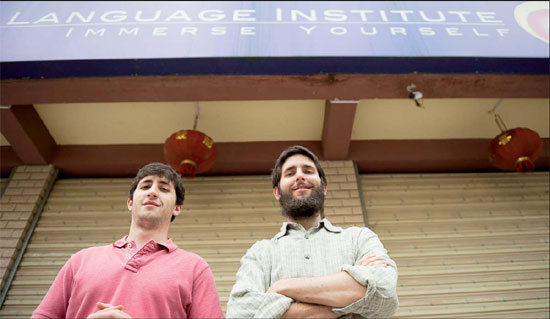Hooked on Mandarin
Updated: 2012-12-07 07:36
By Mike Peters (China Daily)
|
||||||||
|
Robbie Fried (right) and his brother Brad gave their dream a kick start with a $10,000 loan. Photos Provided to China Daily |
Unhappiness with traditional classroom Teaching leads an American to open his own language school
If Brad Fried liked milk, there's no telling where his younger brother Robbie would be today.
When the elder Fried came to Beijing in 2001 as a 22-year-old native of Virginia, he was delighted to find that, unlike in the West, he did not have to worry that dairy products lurked in all sorts of prepared foods. Milk, cream and cheese were notstaples of cooking and food processing in China.
That helped him to settle down to a happy life as an expat, first as an exchange student and later as an English teacher in Guilin, a city in southwest China's Guangxi Zhuang autonomous region. And that set the stage for his brother, who came out for a three-week vacation in 2006 and heard his own siren song.
Related: NY language students take to Mandarin
"I'd been here about two days, and I was hooked," Robbie Fried says. "For me it was the language. My experience with foreign languages before was in a classroom on the east coast of the US. It was basically an academic exercise, with no tangible benefit.
"But when I came here, and saw how quickly you could connect with people, how excited my language partner was - it was just real."
So instead of going home after his scheduled holiday, the younger Fried spent two months memorizing vocabulary and then taking it to the street. The experience stimulated him to enroll in Mandarin study at a university. But instead of getting the boost he expected, he hit a brick wall.
"It was like I'd carried the old classroom experience across the ocean," he says. "There were a thousand foreigners studying Chinese - completely sectioned off from the university environment. We walked to class with other foreigners, where there was one Mandarin speaker in the room - the teacher. So English was the medium of communication among ourselves, whether in class or segregated in our dining hall."
In Guizhou with his brother, Mandarin had been organic and alive - a way to connect with people, to buy bread and cabbage, and to find your way in a new culture. In Beijing it was suddenly theoretical, something in a book. "I thought Beijing was amazing," he says. "But the class structure made it seem more difficult than it was.
"I saw a lot of my classmates were discouraged. It was the opposite from my own first experience in Guilin, when I was very excited about my prospects for learning."
Many Americans have an itch to learn Mandarin - instruction has grown by a factor of 12 in the past decade, he says.
"So at that point it was my goal to tear down all the barriers. Sparks flew when I combined three factors. There was a huge market for Mandarin learning, the quality of service was currently insufficient, and most foreign students were being overcharged."
Overcharged?
"Most foreign students - Americans, anyway - come to China to study through their home university," he says. "That means they are paying the US tuition rate."

 Relief reaches isolated village
Relief reaches isolated village
 Rainfall poses new threats to quake-hit region
Rainfall poses new threats to quake-hit region
 Funerals begin for Boston bombing victims
Funerals begin for Boston bombing victims
 Quake takeaway from China's Air Force
Quake takeaway from China's Air Force
 Obama celebrates young inventors at science fair
Obama celebrates young inventors at science fair
 Earth Day marked around the world
Earth Day marked around the world
 Volunteer team helping students find sense of normalcy
Volunteer team helping students find sense of normalcy
 Ethnic groups quick to join rescue efforts
Ethnic groups quick to join rescue efforts
Most Viewed
Editor's Picks

|

|

|

|

|

|
Today's Top News
Chinese fleet drives out Japan's boats from Diaoyu
Health new priority for quake zone
Inspired by Guan, more Chinese pick up golf
Russia criticizes US reports on human rights
China, ROK criticize visits to shrine
Sino-US shared interests emphasized
China 'aims to share its dream with world'
Chinese president appoints 5 new ambassadors
US Weekly

|

|







